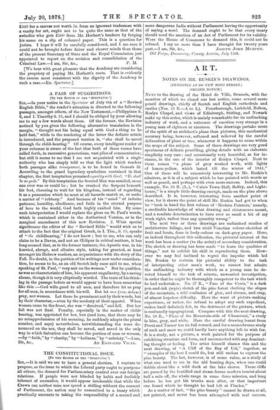A PAIR OF SUGGESTIONS.
[TO THE EDITOR OF THE " SPEOTLTOR.1
SIR,—In your notice in the Spectator of July 6th of a " Revised English Bible," the reader's attention is directed to the following passages, amongst others, of the New Testament,—Philippians 6, and I. Timothy ii. 15, and I should be obliged by your allowing me to say a few words about them. Of the former, the Revision noticed by you gives the following alternative translation in the margin, " thought not his being equal with God a thing to be held fast," while in the rendering of the latter the definite article is introduced, and the proposed version is, " she shall be saved through the child-bearing." Of course, every intelligent reader of your columns is aware of the fact that both of these verses have -called forth, in successive generations, vast piles of commentaries ; but still it seems to me that I am not acquainted with a single authority who has simply told us that the light which renders both passages alike transparent, is to be found in Genesis iii. According to the grand legendary symbolism contained in that -chapter, the first temptation promised equality with God; "Ye shall be as gods." By this temptation the Second Man was assailed, as no one ever was or could be ; but he crushed the Serpent beneath his feet, choosing to wait for his kingdom, instead of regarding it as a possession which he must at all hazards snatch at, or make a matter of " robbery." And because of his " mind" of infinite patience, humility, obedience, and faith in the eternal purpose of love to the world, God hath highly exalted him. By some such interpretation I would replace the gloss on St. Paul's words, which is contained either in the Authorised Version, or in the marginal amendment of this new Revision. 2. What special significance the editor of the " Revised Bible " would wish us to attach to the fact that the original Greek, in I. Tim., ii. 15, speaks of " the childbearing," I do not know ; but to me, who can only 'claim to be a Davus, and not an CEdipus in critical matters, it has long seemed that, as in the former instance, the Apostle was, in his hurried, abrupt, and allusive style, taking for granted, at least amongst his Hebrew readers, an acquaintance with the story of the Fall. No doubt, in the portion of his writings now under considera- tion, he seems to be, as an old Scotch lady once said to me, when speaking of St. Paul, " very sair on the women." But he qualifies, as was so characteristic of him, his apparent ungallantry, by a saving clause, though it is very elliptically worded. The train of his think- ing in the passage before us would appear to have been somewhat like this :—God wills good to all men, and therefore let us pray for all men, in accordance with his will. But let men (roil; 'aybpag) pray, not women. Let these be prominent not by their words, but by their character,—even by the modesty of their apparel. When woman came to the front, she was " deceived," and fell. But her fall was not final. Penalty, especially in the matter of child- bearing, was appointed for her, but (and here, that there may be no misapprehension of his meaning, he suddenly adopts the plural number, and says) nevertheless, notwithstanding the woes de- nounced on the sex, they shall be saved, and saved in the only way in which Salvation can become the portion of man or woman, —by " faith," by " charity," by " holiness," by " sobriety."—I am,


































 Previous page
Previous page